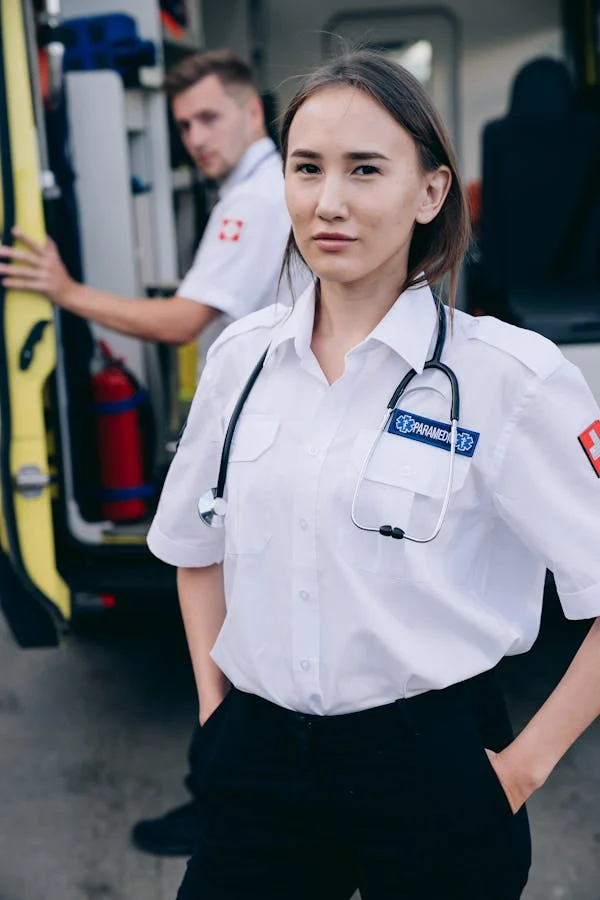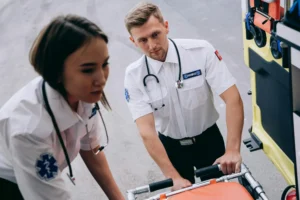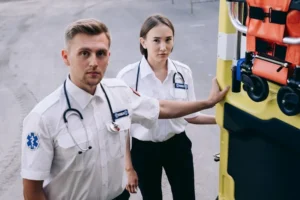Event medical teams are key to ensuring safety at gatherings, from small community events to large festivals. On-site teams provide event medical services, offering quick care for emergencies, minor injuries, and illnesses. Their presence allows immediate response, preventing escalation of health issues. With these services, organizers can focus on the event, knowing medical needs are covered. Teams also coordinate with local emergency services, improving their ability to manage serious situations. Recognizing their value helps organizers plan events with confidence and readiness.
On-Site Medical Care
Event medical teams provide immediate medical attention to attendees, allowing for quick response times. Their presence helps manage health issues effectively, providing peace of mind for organizers and participants alike.
First Aid Stations
First aid stations handle minor injuries and illnesses. Staffed by trained medical personnel, these stations treat cuts, sprains, and other non-serious conditions. Located throughout the event venue, they are easy to access, making it simple for attendees to get care quickly. This setup reduces the strain on local emergency services and helps keep minor issues from becoming major problems. Having these stations in place ensures that attendees can enjoy the event with a sense of security and well-being.
Mobile Medical Units
Mobile medical units allow teams to reach different areas of the event quickly. These units are equipped with necessary medical supplies and staffed by skilled personnel. They can move throughout large venues like festivals or sports events, providing flexible and comprehensive care. This mobility means help is always nearby, no matter where an incident occurs. It improves response times and helps manage emergencies more effectively. With mobile units, the event remains safer, and medical teams can address issues promptly and efficiently.
Emergency Response
Effective emergency response is vital for managing serious medical situations during events. Quick action can make a significant difference in outcomes for those in need.
CPR and AED Administration
Event medical teams are trained to perform CPR and use AEDs to respond to cardiac emergencies. When someone suffers a cardiac arrest, these teams can provide immediate assistance, increasing the chances of survival. The presence of trained professionals with the right equipment means that life-saving measures are applied without delay. This readiness is crucial in crowded places where every second counts, such as concerts or sports events.
Trauma Care
In cases of severe injuries, event medical teams provide initial trauma care and stabilize patients for transport to hospitals. These teams are equipped to handle serious injuries, such as fractures, head injuries, and severe cuts. They work quickly to assess the situation, administer necessary treatment, and prepare the patient for safe transfer. This immediate care can prevent complications and improve the chances of recovery. Having skilled trauma care on-site is vital for events with high-risk activities, such as motor sports or large-scale festivals.
Crowd Health Management
Managing the overall health of the crowd helps prevent medical issues and promotes a safer environment. This proactive approach is important for the well-being of all attendees.
Health Screenings
Health screenings help identify potential issues among attendees before they escalate into emergencies. By conducting these screenings, medical teams can detect signs of illness or health problems early. This allows for timely intervention and treatment, reducing the risk of more serious conditions. Screenings can include checking vital signs, such as blood pressure and temperature. These measures are especially useful at large events where people may have underlying health concerns.
Disease Prevention
Implementing measures to prevent the spread of infectious diseases is a key aspect of crowd health management. Medical teams focus on hygiene practices, such as providing hand sanitizing stations and promoting hand washing. They also monitor for symptoms of contagious illnesses among attendees. Vaccination checks and health advisories can be part of the strategy to prevent outbreaks. This proactive approach helps maintain a healthy environment and reduces the risk of disease transmission at large gatherings.
Coordination with Local Emergency Services
Collaboration with local emergency services improves the effectiveness of medical response at events. This teamwork ensures that medical and emergency personnel work together seamlessly during emergencies.
Communication Systems
Effective communication systems ensure seamless coordination between event medical teams and local emergency services. These systems include radios, mobile phones, and other communication devices that allow for quick information sharing. Clear communication helps in dispatching the right resources to the correct location promptly. It also aids in providing updates and instructions during emergencies. By maintaining open lines of communication, both teams can respond more efficiently, reducing the time it takes to address medical issues.
Joint Training Exercises
Regular joint training exercises with local emergency services enhance response times and coordination. These exercises involve simulations of various emergency scenarios that might occur at events. Through these drills, medical teams and emergency services learn to work together effectively. They practice roles, procedures, and communication methods, ensuring that everyone knows their responsibilities. This preparation helps both teams respond quickly and efficiently during real emergencies, improving overall event safety.
Post-Event Medical Reporting
After the event, medical teams provide reports that help organizers improve future event safety. These reports offer valuable insights into the medical response and highlight areas for improvement.
Incident Documentation
Detailed documentation of medical incidents helps in evaluating the effectiveness of the medical response. Each incident is recorded, noting the nature of the injury or illness, the response time, and the treatment provided. This information is essential for understanding how well the medical team handled each situation. By reviewing these records, organizers can identify patterns and areas that may need more attention or resources. This process helps in planning better medical coverage for future events.
Feedback and Recommendations
Providing feedback and recommendations aids in improving medical preparedness for future events. Medical teams offer their observations on what worked well and what could be improved. These suggestions might include changes in equipment, staffing, or procedures. Organizers use this feedback to make informed decisions about future event planning. Implementing these recommendations can lead to more effective medical responses and safer events. This ongoing process of feedback and adjustment ensures that each event builds on the lessons learned from previous ones.
Comprehensive Care for Event Attendees
Event medical teams are vital for attendee health and safety. They provide on-site care, emergency response, and crowd health management, ensuring safe events. Teams work with local emergency services and offer detailed post-event reports to improve their efficiency. Services like first aid stations, mobile medical units, and health screenings help handle emergencies and prevent issues. Organizers should prioritize having skilled medical teams to promptly address health needs and create a secure environment.







